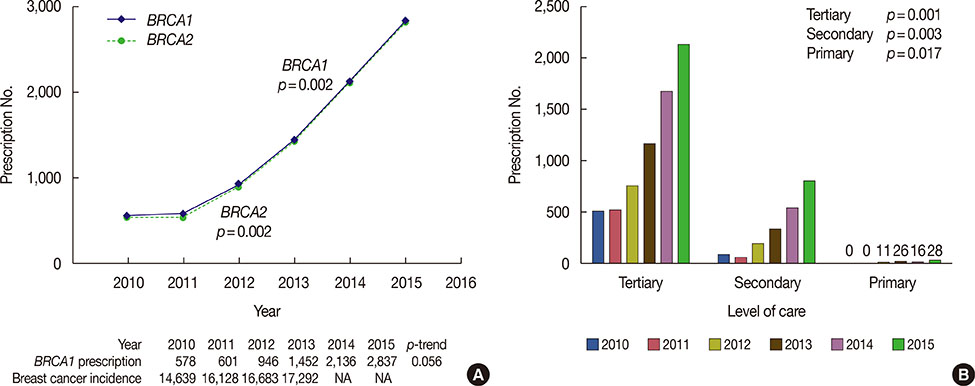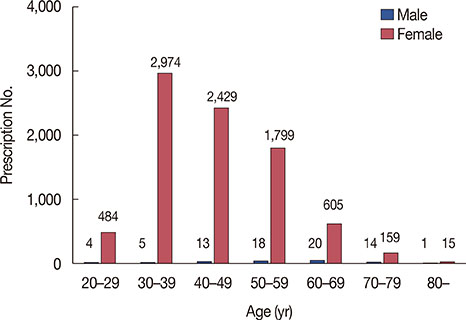Influence of the Angelina Jolie Announcement and Insurance Reimbursement on Practice Patterns for Hereditary Breast Cancer
- Affiliations
-
- 1Department of Surgery, Soonchunhyang University Seoul Hospital, Seoul, Korea.
- 2Department of Surgery, Daerim St. Mary's Hospital, Seoul, Korea. brcakorea@gmail.com
- 3Department of Surgery, Seoul National University Bundang Hospital, Seoul National University College of Medicine, Seongnam, Korea.
- 4Department of Biostatistics, Soonchunhyang University College of Medical Sciences, Seoul, Korea.
- 5Department of Surgery, Soonchunhyang University Bucheon Hospital, Bucheon, Korea.
- KMID: 2389759
- DOI: http://doi.org/10.4048/jbc.2017.20.2.203
Abstract
- Lack of awareness, the stigma of carrying a genetic mutation, and economic factors are barriers to acceptance of BRCA genetic testing or appropriate risk management. We aimed to investigate the influence of Angelina Jolie's announcement of her medical experience and also health insurance reimbursement for BRCA gene testing on practice patterns for hereditary breast and ovarian cancer (HBOC). A survey regarding changes in practice patterns for HBOC before and after the announcement was conducted online. The rate of BRCA gene testing was obtained from the National Health Insurance Review and Assessment Service database. From May to August 2016, 70 physicians responded to the survey. Genetic testing recommendations and prophylactic management were increased after the announcement. Risk-reducing salpingo-oophorectomy and contralateral prophylactic mastectomy was significantly increased in BRCA carriers with breast cancer. The BRCA testing rate increased annually. Health insurance and a celebrity announcement were associated with increased genetic testing.
Keyword
MeSH Terms
Figure
Cited by 5 articles
-
BRCA1/2 mutations, including large genomic rearrangements, among unselected ovarian cancer patients in Korea
Do-Hoon Kim, Chi-Heum Cho, Sun Young Kwon, Nam-Hee Ryoo, Dong-Seok Jeon, Wonmok Lee, Jung-Sook Ha
J Gynecol Oncol. 2018;29(6):. doi: 10.3802/jgo.2018.29.e90.Disparities between Uptake of Germline
BRCA1/2 Gene Tests and Implementation of Post-test Management Strategies in Epithelial Ovarian, Fallopian Tube, or Primary Peritoneal Cancer Patients
Young Min Hur, Jaehee Mun, Mi-Kyung Kim, Maria Lee, Yun Hwan Kim, Seung-Cheol Kim
J Korean Med Sci. 2021;36(38):e241. doi: 10.3346/jkms.2021.36.e241.Clinicopathological Features of Patients with the
BRCA1 c.5339T>C (p.Leu1780Pro) Variant
Hyung Seok Park, Jai Min Ryu, Ji Soo Park, Seock-Ah Im, So-Youn Jung, Eun-Kyu Kim, Woo-Chan Park, Jun Won Min, Jeeyeon Lee, Ji Young You, Jeong Eon Lee, Sung-Won Kim
Cancer Res Treat. 2020;52(3):680-688. doi: 10.4143/crt.2019.351.Attitudes toward Risk-Reducing Mastectomy and Risk-Reducing Salpingo-oophorectomy among Young, Unmarried, Healthy Women in Korea
Boyoung Park, Dongwon Kim, Jiyoung Kim, Bom Yi Lee, Junghyun Yoon, Sung-Won Kim
Cancer Res Treat. 2022;54(2):375-382. doi: 10.4143/crt.2021.449.Implementation of BRCA Test among Young Breast Cancer Patients in South Korea: A Nationwide Cohort Study
Yung-Huyn Hwang, Tae-Kyung Yoo, Sae Byul Lee, Jisun Kim, Beom Seok Ko, Hee Jeong Kim, Jong Won Lee, Byung Ho Son, Il Yong Chung
Cancer Res Treat. 2024;56(3):802-808. doi: 10.4143/crt.2023.1186.
Reference
-
1. Kang E, Kim SW. The Korean hereditary breast cancer study: review and future perspectives. J Breast Cancer. 2013; 16:245–253.
Article2. Han SA, Park SK, Ahn SH, Lee MH, Noh DY, Kim LS, et al. The Korean Hereditary Breast Cancer (KOHBRA) study: protocols and interim report. Clin Oncol (R Coll Radiol). 2011; 23:434–441.
Article3. Hawkes N. “Angelina effect” led to more appropriate breast cancer referrals, research shows. BMJ. 2014; 349:g5755.
Article4. James PA, Mitchell G, Bogwitz M, Lindeman GJ. The Angelina Jolie effect. Med J Aust. 2013; 199:646.
Article5. National Cancer Information Center. Annual report of cancer statistics in Korea in 2013. Accessed June 7th, 2017. http://www.cancer.go.kr/.6. Couch FJ, Farid LM, DeShano ML, Tavtigian SV, Calzone K, Campeau L, et al. BRCA2 germline mutations in male breast cancer cases and breast cancer families. Nat Genet. 1996; 13:123–125.
Article7. Ottini L, Masala G, D'Amico C, Mancini B, Saieva C, Aceto G, et al. BRCA1 and BRCA2 mutation status and tumor characteristics in male breast cancer: a population-based study in Italy. Cancer Res. 2003; 63:342–347.8. Kosenko KA, Binder AR, Hurley R. Celebrity influence and identification: a test of the Angelina effect. J Health Commun. 2016; 21:318–326.
Article9. Freedman R, Mountain H, Karina D, Schofield L. A retrospective exploration of the impact of the ‘Angelina Jolie Effect’ on the single State-Wide Familial Cancer Program in Perth, Western Australia. J Genet Couns. 2017; 26:52–62.
Article10. Evans DG, Barwell J, Eccles DM, Collins A, Izatt L, Jacobs C, et al. The Angelina Jolie effect: how high celebrity profile can have a major impact on provision of cancer related services. Breast Cancer Res. 2014; 16:442.
Article11. Raphael J, Verma S, Hewitt P, Eisen A. The impact of Angelina Jolie (AJ)'s story on genetic referral and testing at an Academic Cancer Centre in Canada. J Genet Couns. 2016; 25:1309–1316.
Article12. Malcolm CM, Javed MU, Nguyen D. Has the Angelina Jolie effect led to an increase in risk reducing mastectomy and breast reconstruction in Wales: a retrospective, single centre cohort study. J Plast Reconstr Aesthet Surg. 2016; 69:288–289.
Article13. Evans DG, Wisely J, Clancy T, Lalloo F, Wilson M, Johnson R, et al. Longer term effects of the Angelina Jolie effect: increased risk-reducing mastectomy rates in BRCA carriers and other high-risk women. Breast Cancer Res. 2015; 17:143.
Article14. Kang E, Ahn SH, Noh WC, Noh DY, Jung Y, Kim LS, et al. The change of practice patterns of the hereditary breast cancer management in Korea after the Korean Hereditary Breast Cancer Study. J Breast Cancer. 2010; 13:418–430.
Article
- Full Text Links
- Actions
-
Cited
- CITED
-
- Close
- Share
- Similar articles
-
- Practice Patterns of Surgeons for the Management of Hereditary Breast Cancer in Korea
- Basic knowledge for counseling patients undergoing risk-reducing salpingo-oophorectomy
- Korean Hereditary Breast Cancer
- Changes in Korean National Healthcare Insurance Policy and Breast Cancer Surgery Trend in Korea
- Hereditary Ovarian Cancer: Report of 6 Families



